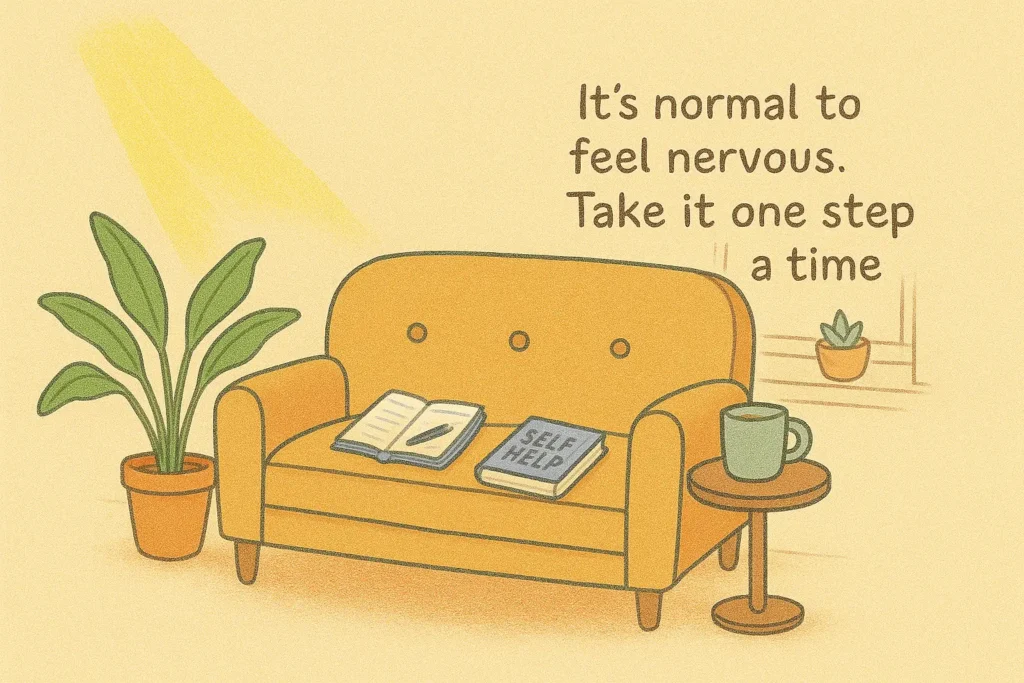Starting therapy can be a scary and uncertain step, especially if you’ve never talked openly about your emotions before. It often feels like standing at the edge of a cliff, unsure of what lies ahead. The idea of sharing your innermost struggles can be overwhelming, and the fear of the unknown keeps many people from seeking the help they need. But taking the first step toward starting therapy can lead to deep healing, personal growth, and a better understanding of yourself.
So, why is starting therapy so intimidating? Let’s unpack some of the common fears and how we can work through them together.
One of the biggest fears is the vulnerability that therapy requires. Letting someone else in to see your deepest emotions—your pain, your insecurities, your doubts—can feel like stripping away a layer of yourself. It’s hard to imagine letting someone else see that part of you. But here’s the truth: vulnerability isn’t a weakness. It’s actually a powerful step toward healing. Therapists are there to listen, not to judge, and they create a safe space where you can express yourself freely. Over time, you’ll come to understand that opening up in therapy isn’t about weakness—it’s about strength, courage, and growth.
Another common fear is the concern that your therapist might not truly understand what you’re going through. Everyone’s experience is unique, and mental health issues can often feel isolating. You might worry that your struggles are too complex or personal for anyone to truly grasp. But the reality is, a therapist’s job isn’t to know exactly what you’ve been through, but to listen and support you as you work through your feelings. If, at any point, you feel misunderstood, speak up. Therapy is a partnership, and communication is key. Your therapist is there to work with you, not make assumptions about your experience.
Therapy often means revisiting painful memories, experiences, and emotions. It’s completely normal to fear reliving those difficult moments. But avoiding those feelings doesn’t make them go away—in fact, it usually prolongs the pain. A good therapist will help you navigate through those tough emotions at your pace, providing the support you need to process them in a healthy way. It might feel uncomfortable at first, but facing those emotions is a crucial part of healing. It’s not about reopening wounds; it’s about allowing them to heal.
There’s also a fear that therapy might make you feel worse before you feel better. It’s true that some sessions may bring up difficult emotions, but that doesn’t mean therapy is making things worse. It’s helping you make sense of your emotions, so they no longer control your life. The process can be uncomfortable, but it’s often a sign of progress. Therapy is about learning to understand and manage your feelings in a way that helps you move forward. It’s not about quick fixes—it’s a gradual process, one step at a time.
And then there’s the fear of commitment. Committing to therapy can feel overwhelming, especially when you’re unsure of what to expect or whether it’ll work for you. But therapy isn’t about committing to a rigid, unchanging plan. It’s an ongoing process, one that evolves as you do. If one therapist doesn’t feel like the right fit, it’s okay to try someone else. Therapy is about finding what works for you, and it’s okay to take it one session at a time.
If you’re putting off therapy, know that you’re not alone. Most people feel the same way when they first start their journey. But even considering therapy is a big step, and it’s one worth taking. Mental health care is a process—it takes time, and there will be ups and downs along the way. But each step forward brings you closer to healing, and every session helps you build the tools you need to navigate life’s challenges with resilience.
Remember, therapy isn’t about “fixing” you. It’s about helping you understand yourself better, build emotional resilience, and learn how to cope with life’s difficulties. It’s not about being perfect—it’s about learning to accept yourself and asking for help when you need it.
So take a deep breath. Trust yourself. Healing starts with that first step, and you don’t have to take it alone. There’s a community of therapists ready to support you with empathy and compassion, without judgment. Starting therapy may feel scary at first, but it’s just the beginning of a journey that could change your life.


